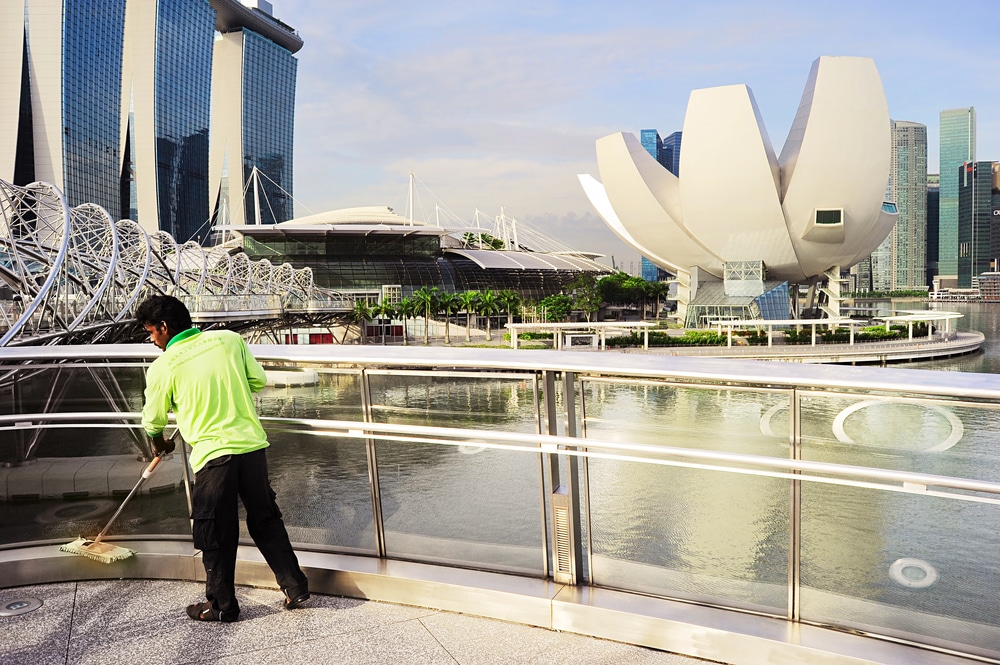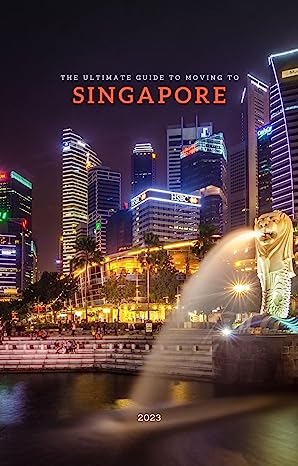Singapore takes a different approach to wage regulation compared to most countries worldwide. Singapore does not have a universal minimum wage, but operates sector-specific wage floors through the Progressive Wage Model (PWM) and the Local Qualifying Salary (LQS) system. This means minimum pay varies depending on the industry and employment type.
The PWM covers specific sectors like cleaning, security, landscaping, and retail with mandatory minimum wages tied to skills and career progression. For workers in uncovered industries, salaries are typically determined through employer-employee negotiations or union agreements.
This system balances worker protection with economic flexibility, incorporating recent policy updates that affect foreign worker quotas and training requirements across different sectors.
Does Singapore Have a Minimum Wage?
Singapore does not have a universal minimum wage system like most countries. The government uses the Progressive Wage Model (PWM) for specific sectors and relies on market forces to determine wages across other industries.
Key Differences From Global Minimum Wage Systems
Singapore’s approach differs significantly from traditional minimum wage policies found in other countries. Most nations establish a single hourly or monthly rate that applies across all sectors and job types.
The city-state instead focuses on sector-specific wage floors through the PWM. This system covers cleaning, security, landscape, retail, food services, waste management, drivers, and administrative assistants.
The PWM applies to:
- Singaporeans and Permanent Residents only
- Full-time, part-time, and temporary employees
- Specific job categories within covered sectors
The Ministry of Manpower states that wages should be determined by market demand and supply for labour. This philosophy contrasts with countries that set blanket minimum rates to protect all workers from exploitation.
For businesses hiring foreign workers, a Local Qualifying Salary (LQS) requirement exists. Companies must pay Singaporean and PR employees at least $1,600 monthly for full-timers and $10.50 hourly for part-timers. The government clarifies this is not a minimum wage but a threshold preventing token salaries.
Wage Determination Mechanisms in Singapore
The National Wages Council provides salary recommendations that are not legally binding. Employers and employees negotiate wages through direct discussions or collective bargaining agreements.
PWM minimum wages vary by sector and increase annually:
- General cleaners: $1,740-$2,060 basic monthly salary (July 2024-June 2025)
- These rates rise to $1,910-$2,325 (July 2025-June 2026)
The PWM links wage increases to skills upgrading and productivity improvements. Workers receive higher pay after completing mandatory training requirements and gaining qualifications.
Additional PWM benefits include:
- Annual bonuses (2 weeks for cleaning sector, 1 month for waste management)
- Government co-funding for wage increases through the Progressive Wage Credit Scheme
- Workfare Skills Support to subsidise training costs
Employers must comply with PWM requirements or face penalties, including fines up to $5,000 and potential licence suspension or revocation.
How the Progressive Wage Model Works
The Progressive Wage Model operates through sector-specific wage requirements tied to skills development and career advancement. It establishes minimum wage levels for different job roles whilst creating pathways for workers to progress through structured training and productivity improvements.
Purpose and Policy Objectives
The Progressive Wage Model serves as Singapore’s approach to lifting wages for lower-income workers without implementing a universal minimum wage system. Tripartite committees consisting of unions, employers and government agencies develop sector-specific wage structures.
The model aims to create sustainable wage growth through four key areas. Workers advance through skills upgrading, productivity improvement, career advancement and wage progression ladders.
Key objectives include:
- Uplifting wages for lower-wage workers
- Linking pay increases to skills development
- Improving productivity standards across sectors
- Creating clear career pathways with structured progression
The system benefits multiple stakeholders. Workers receive higher wages and better career prospects. Businesses gain from improved productivity and service quality. Consumers experience enhanced service standards.
How PWM Sets Sector-Specific Wages
Each sector covered by the Progressive Wage Model has specific wage requirements determined through industry consultation. Employers must pay at least the prescribed PWM wage for eligible workers based on their job level.
Current sectors with PWM requirements:
- Cleaning sector (since September 2014)
- Security sector (since September 2016)
- Landscape sector (since June 2016)
- Lift and escalator sector (since May 2019)
- Retail sector (since September 2022)
- Food services sector (since March 2023)
- Waste management sector (since July 2023)
Different regulatory bodies implement PWM requirements. Some sectors use licensing conditions whilst others tie requirements to work pass applications. The National Environment Agency regulates cleaning and waste management sectors through licensing conditions.
Career Progression and Wage Tiers
The Progressive Wage Model creates structured wage tiers linked to specific job roles and skill levels. Workers can advance to higher wage levels by completing required training and demonstrating improved capabilities.
Each sector has defined progression pathways with corresponding wage increases. Workers start at entry-level positions and can move up through intermediate to supervisory roles. Training requirements are mandatory for progression between tiers.
Employers must meet PWM training requirements for eligible workers. The Workfare Skills Support scheme helps offset training costs for Singaporean employees. Workers can verify their wage entitlements through the Progressive Wage Portal.
The system creates predictable career advancement opportunities. Workers know exactly what training and skills they need to reach higher wage levels. This clarity helps both employees and employers plan for professional development and business growth.
Sectors and Jobs Covered by the Progressive Wage Model
The Progressive Wage Model applies to nine specific sectors and occupations across Singapore, covering more than 155,000 local workers and permanent residents. These sectors include traditional service industries like cleaning and security, as well as expanding areas such as food services and retail.
Cleaning and Security
The cleaning sector was among the first to adopt the progressive wage model in 2014. Workers in this sector include office cleaners, public area maintenance staff, and specialised cleaning personnel in healthcare facilities.
Security personnel covered under the progressive wage model include building security officers, event security staff, and patrol officers. The model establishes clear wage levels based on skill certifications and experience levels.
Both sectors require workers to complete certified training programmes to advance to higher wage levels. These programmes cover areas such as workplace safety, customer service, and sector-specific technical skills.
The minimum wages in these sectors increase progressively as workers gain additional qualifications and certifications. This structure encourages professional development whilst providing immediate wage improvements.
Landscape and Waste Management
Landscape workers covered by the progressive wage model include ground maintenance staff, horticulture specialists, and tree care professionals. The sector encompasses both public and private landscape maintenance roles.
Waste management roles include waste collection operators, recycling facility workers, and waste sorting personnel. These positions require specific safety training and equipment handling certifications.
Workers in both sectors must complete modules covering environmental sustainability practices and occupational health standards. Advanced certifications in equipment operation and supervisory skills lead to higher wage tiers.
The progressive wage structure in these sectors reflects the technical knowledge required for modern landscape maintenance and waste processing operations.
Food Services and Retail
Food service workers under the progressive wage model include kitchen assistants, food preparation staff, and service crew members in qualifying establishments. The coverage applies to both institutional food services and commercial food operations.
Retail workers covered include sales assistants, cashiers, and customer service representatives in participating retail chains. The model focuses on customer-facing roles that require interpersonal skills development.
Training requirements for food service workers include food safety certification, hygiene standards, and customer service skills. Retail workers complete modules on product knowledge, sales techniques, and inventory management.
Career progression in both sectors links wage increases to demonstrated competencies rather than tenure alone. This approach supports skills-based advancement for service industry workers.
Administration, Drivers, and Other Roles
Administrative roles covered include data entry clerks, filing assistants, and basic clerical support positions. These roles typically serve as entry points for workers transitioning between sectors or entering the workforce.
Drivers covered by the progressive wage model include delivery personnel and transport service operators. The sector requires specific licensing and safety certifications for wage advancement.
Other occupations include lift and escalator maintenance technicians, who require specialised technical training and safety certifications. These roles command higher starting wages due to their technical requirements.
The administrative and transport sectors emphasise both technical skills and workplace competencies such as time management and professional communication. Workers progress through wage levels by demonstrating proficiency in job-specific tasks and completing recognised training programmes.
Minimum Wage Requirements for Local and Foreign Employees
Singapore implements different wage requirements for local workers and foreign employees through the Local Qualifying Salary system and specific work pass thresholds. Companies hiring foreign workers must comply with both local wage standards and pass-specific salary minimums.
Local Qualifying Salary for Singaporeans and PRs
The Local Qualifying Salary sets the minimum wage threshold at $1,600 per month for full-time Singapore citizens and permanent residents. This requirement applies specifically to companies that employ foreign workers on work permits, S passes, or employment passes.
Employers must pay at least $1,600 monthly to full-time local employees working 35-44 hours per week. Part-time workers earning less than 35 hours weekly must receive a minimum of $10.50 per hour gross pay.
The LQS serves a dual purpose in foreign worker quota calculations. Local employees earning at least $1,600 monthly count as one full local worker for quota purposes. Those earning between $800-$1,599 monthly count as 0.5 local workers.
Companies must also pay Progressive Wages to local employees in sectors covered by the Progressive Wage Model. This requirement works alongside the LQS to establish comprehensive wage protection for Singapore workers.
Wage Thresholds for Work Pass Holders
Foreign workers face different minimum requirements for their salary in Singapore, depending on their work pass category. Employment Pass holders typically require higher salary thresholds compared to S Pass and Work Permit holders.
The Ministry of Manpower regularly reviews and adjusts these thresholds to maintain labour market balance. These minimum salary requirements aim to attract skilled foreign talent whilst protecting local employment opportunities.
Work Pass salary requirements vary by sector, experience level, and qualifications. Employers must verify current thresholds before hiring foreign employees, as these amounts change periodically based on economic conditions and policy adjustments.
Compliance and Penalties for Employers
Employers who fail to meet LQS requirements face restrictions on hiring new foreign workers and renewing existing work passes. The Ministry of Manpower conducts regular audits to verify compliance with wage requirements.
Non-compliant companies may lose their ability to apply for new work passes until they rectify wage deficiencies. Persistent violations can result in work pass quota reductions and other administrative penalties.
Employees can verify their wage details and employer compliance through the Progressive Wage Portal. This system allows workers to check if they receive correct wages according to current requirements.
Companies must maintain accurate payroll records and submit regular reports to demonstrate ongoing compliance with both LQS and work pass salary requirements.
Recent Updates and Changes to Wage Policies
Singapore’s wage framework has undergone significant transformations in 2024 and 2025. The National Wages Council recommends salary increases of 5.5% to 7.5% for lower-wage workers, while the Progressive Wage Model continues expanding into additional sectors.
2024–2025 Sector Wage Tables
The Progressive Wage Model has implemented updated minimum wage requirements across multiple sectors for 2024-2025. In-house cleaners and general cleaners working at office and commercial sites must receive at least $1,740 monthly from 1 July 2024 to 30 June 2025.
General cleaners employed in conservancies receive higher rates at $2,060 monthly during the same period. These wages will increase substantially in the following year, rising to $1,910 and $2,325 respectively from 1 July 2025 to 30 June 2026.
Career progression within the cleaning sector shows clear wage ladders. Refuse collectors in conservancies receive $2,270 monthly, whilst supervisors earn $2,455 and truck drivers receive $2,620.
The PWM also mandates sector-specific bonuses. Cleaning sector employees receive at least two weeks of basic monthly salary as PWM bonus. Waste management workers receive one month of basic salary as bonus, provided they have worked for the same employer for 12 months.
Expansion of PWM to New Industries
The Progressive Wage Model has broadened its coverage significantly between 2022 and 2025. New sectors now include retail, food services, and waste management, extending minimum wage protections to thousands of additional workers.
Cross-sector job categories now fall under PWM requirements. Drivers and administrative assistants receive coverage regardless of their industry, creating standardised minimum wages across different economic sectors.
Coverage extends beyond full-time employees to include part-time and temporary workers. Part-time employees receive pro-rated PWM wages based on hours worked relative to full-time equivalents with similar job responsibilities.
The Local Qualifying Salary requirement remains at $1,600 monthly for full-time Singaporean and permanent resident employees. Part-time workers must receive at least $10.50 hourly under this requirement, which applies to firms hiring foreign workers.
Government Initiatives for Wage Progression
The Progressive Wage Credit Scheme provides co-funding for eligible wage increases until 2026. This transitional support helps employers adjust to mandatory wage increases for lower-wage workers covered by PWM requirements.
Training requirements form a core component of wage progression under the PWM. Employers must facilitate employee access to skills upgrading courses and qualifications that lead to higher wage tiers.
The Workfare Skills Support scheme subsidises training costs for Singaporean employees. This initiative reduces employer burden whilst supporting worker skill development and career advancement.
Compliance enforcement has strengthened with penalties for PWM violations. Maximum fines reach $5,000 in the cleaning sector, with serious breaches potentially resulting in licence suspension or revocation.
The National Wages Council’s 2024 guidelines emphasise linking wages to productivity improvements. Employers should reflect sustained productivity growth in compensation packages for all worker categories.




